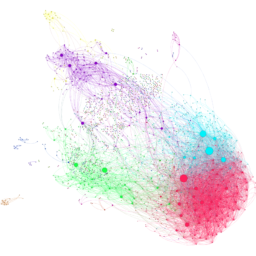Back in 2009, when I started working on my thesis about marketing music through non-linear communication, I came to a realization. I was going to be digging through a lot of data, information and doing my own qualitative and quantitative research: this is something other people will be interested in also. So, as I was making discoveries, I started tweeting my findings. This helped me build a following.
Back then, people didn’t have 100k+ followers on Twitter, so it was easy to reach out to any academic, artist, thought leader or executive on there. Even before graduating, I was hired by a Swiss music startup to do online communication strategy. Then I found a talented designer who was willing to design the beautiful site my thesis lives on, for free. I published my thesis and emailed all those influencers I had reached out to and interviewed earlier. Many of them shared my thesis to their social media pages. It got me an invitation to speak at Midem, one of Europe’s most important music business conferences, where Ian C Rogers (former CEO of Beats Music, later Senior Director of Apple Music) announced me as Mark Ronson was leaving the stage together with an important marketing exec from Coca-Cola. It was probably the first time I experienced impostor syndrome.
In the meantime, I had been hired to do product strategy for a company in Moscow that operated a music streaming service, a kind of ‘Spotify for books’, and a knowledge platform. They had noticed me because one of the people I interviewed had shared my thesis on his Facebook page. It was a massive opportunity for someone fresh out of university and my years there were intensely educational.
I hate the phrase ‘content marketing’, but a great content strategy synergizes so well with the rules of the networked age. It helps you build an audience, hold that audience’s attention and, if the content is good, it leverages the power of networks.
This is why the cost of putting music behind payments is sometimes higher than the potential return. If the music is easily accessible, and shareable, you can leverage other people’s audience. You can leverage the power of networks. This is why it’s so important to find ways of capturing value that goes beyond content-oriented transactions. If you’re looking for inspiration, spend a few hours on PledgeMusic, Kickstarter, Indiegogo and Patreon this week and see what others are doing. You can do it too.
Written for my weekly newsletter MUSIC x TECH x FUTURE. If you enjoyed reading this, please consider sharing and subscribing.
